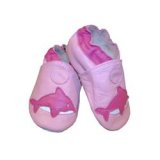 Making your toddler, who is just learning to walk, wear shoes or any protective gear is no child’s play! Refusal to wear shoes has several possible reasons and is characterized by the following:
Making your toddler, who is just learning to walk, wear shoes or any protective gear is no child’s play! Refusal to wear shoes has several possible reasons and is characterized by the following:
- Conflict of Interests: Parents force their toddlers to wear shoes. Children at this age view this as unnecessary, and try to assert their own identity, by simply throwing the shoes away. What results is a power struggle between the parent and the baby.
- Natural vs. unnatural: A child refusing to wear shoes is not abnormal. In fact what seems unnatural is the parent’s insistence that the child wear shoes. Nature protects children’s feet by providing them with padded soles and toes to retain their balance. Your baby has just started experiencing different surfaces such as grass, wooden floors, and your home carpet. It is expected that the child enjoys being barefoot.
- Discomfort: Some shoes may be simply too small or too big for their feet. Some children may not like the idea of a foreign object on their body.
Of course, as a parent, it is important to ensure that your child’s feet are protected from snow, dirt, broken glass, and other sharp objects.
Here are some strategies that you can adopt to change your baby’s outlook towards shoes:
- Be positive – Use praise and motivation to help your child view wearing shoes as a good thing to do. Shouting, yelling, and the use of force will make the baby associate shoes with negative feelings.
- Make it fun – Make it fun for your child to wear shoes. Use music, dance, toys, or any favorite activity that your baby likes, while you slip the shoe on the child’s foot. Allow the baby to choose a favorite color or style. Reserve these “fun shoes” for special events such as a trip to the zoo.
- Use the correct shoe – Frequently, parents buy shoes without realizing how uncomfortable they are for their kids. Buy the right fit. Check if the shoe is light enough so that the child feels close to the experience of being barefoot.
- Barefoot is not a bad option – If nothing works, and if it is safe for the baby to do so, allow the child to remain barefoot.

Kids seem to have better instincts than us grown-ups on many occasions. Letting kids go barefoot is the best advice I’ve heard in years, especially since these days modern society has such an adverse reaction to bare feet and tend to have a servere overdependancy on shoes. Dr. Lynn Staheli, who directed the orthopedics division at the Children’s Hospital in Seattle for 15 years, documented that children raised in parts of the world where shoes are rarely worn had better flexibility, mobility, and strength, which resulted in fewer foot-related problems and injuries. In the 1960 classic “Take Off Your Shoes and Walk,” chiropodist Simon Wikler notes that children who go barefoot regularly develop stronger, healthier, and more functional feet than children who are generally shod. (He notes that a “constantly shoe-wearing tenderfoot” is rarely able to comprehend the innate capability of the human foot.) In a quick 30 minute internet search I found over a dozen medical reports and studies showing the adverse affects shoes have on our bodies from as far back as the turn of the last century and countless news articles from reporters reffering to these and other medical findings supporting this notion. Why then do we insist on wearing shoes so much when being barefoot is so comfortable and healthy? I agree that there is a time and place for shoes but the choice to be barefoot should always be left to each individual.